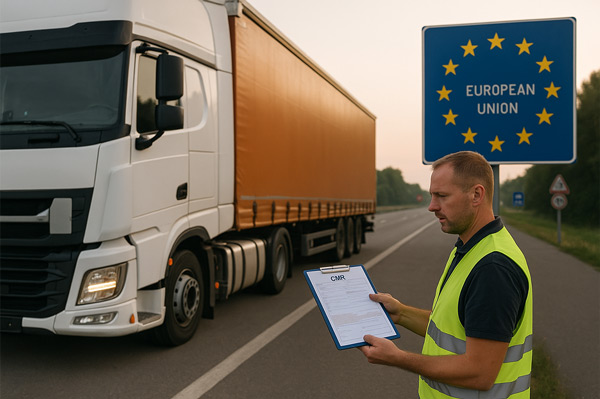International Transport
International freight transport involves the movement of goods between different countries using trucks, trains, ships, or aircraft. The choice of transport mode depends on the type of cargo being carried, client requirements, and the available budget. The primary objective is to ensure timely and secure delivery at a reasonable cost.
According to regulations, “international transport” refers to carriage that extends beyond the borders of the European Union. In contrast, transport between EU member states is defined as “intra-Community transport.”
Main Routes Served by Woz-Trans
Woz-Trans has been organizing international transport for years. Initially, our services primarily covered Eastern Germany—from Chemnitz through Halle, Magdeburg, and Hanover, up to Lübeck, from where we handled cargo bound for Poland.
Over time, we expanded our services to include pan-European transport. Currently, we organize intra-Community transport to and from the Netherlands, Belgium, France, as well as Luxembourg, Italy, and Spain. Additionally, we handle orders for clients to and from Austria, the Czech Republic, and Slovakia.
Our forwarders also possess expertise in transport to Switzerland and Norway. We seamlessly guide our clients through all the complexities of customs clearance, customs documentation, and any issues that might arise with non-EU transport. By entrusting your transport to us, you gain peace of mind at every stage of the service.
Advantages and Challenges of International Goods Transport
International transport enables companies to access new markets and a diverse range of products and raw materials. This allows them to reduce production costs and enhance their competitiveness. At the same time, international operations present certain challenges, including complex customs procedures, differing national regulations, and extensive documentation requirements. The risk of delays, damage, or loss of cargo also increases as goods cross national borders.
Types of International Transport
In international transport, there are five primary modes of carriage, the choice of which depends on the type of cargo, distance, and required delivery time.
- Road transport – by far the most common choice for European routes. Its key advantages include flexibility and the ability to provide door-to-door service.
- Sea transport – ideal for heavy or oversized goods on intercontinental routes. While it is the most cost-effective option, it is associated with longer transit times.
- Air freight – the preferred choice when speed of delivery is the primary concern. It is the fastest solution, but also the most expensive, typically reserved for urgent or high-value goods.
- Rail transport – offers a balance between cost and delivery time. It is faster than sea transport and more environmentally friendly than road transport.
An interesting option is also intermodal transport, which involves combining different modes of transport without transshipping the goods themselves. This solution allows for the optimization of the entire logistics process.
Types of Shipments in International Transport
The type of shipment is selected based on its weight, size, and any special transport requirements. The two basic models are:
In Full Truckload (FTL), the client hires the entire vehicle for their exclusive use. This is the ideal solution for large consignments, ensuring speed and security through direct transport without transshipment.
Less-than-Truckload (LTL) transport involves consolidating smaller shipments from multiple clients into a single vehicle. This allows the client to pay only for the space their cargo occupies, making it a cost-effective option for smaller orders.
Specialized Cargo
There are also specialized types of cargo, such as:
- Dangerous goods (ADR) – which require special permits, markings, and certified drivers.
- Oversized cargo – requires special permits and professional transport management.
- Refrigerated shipments – require vehicles equipped with insulated bodies and refrigeration units, as well as continuous temperature monitoring throughout the transport process.

Poland’s Position in International Road Transport
Since 2014, Poland has ranked first in international road transport in Europe. In 2024, Polish carriers accounted for 20% of all tonne-kilometers. This market share has remained stable for several years and represents a “glass ceiling” that is difficult to surpass under current market conditions.
The dominant destination for Polish carriers is the European Union, with Germany being the most frequent route, accounting for over 35% of all transports to and from Poland. In the last quarter of 2024, the number of freight offers on the Poland-Germany route increased by 131% year-on-year, confirming sustained high demand for this trade lane.
Poland plays a pivotal role in European road transport. Due to its advantageous geographical location, Polish transport companies handle a significant share of carriage within the EU. Regular investments in road infrastructure further strengthen this position, ensuring the reliability and stability of supply chains across Europe. This is further evidenced by the fact that revenue from the transport sector contributes 6% to the national GDP.
Legal Provisions and Regulations
International goods transport is subject to strict legal regulations designed to ensure safety and uniform commercial rules.
Road transport is primarily governed by the CMR Convention , which precisely regulates the carrier’s liability for damage to or loss of goods. Within the European Union, key regulations also define market access, drivers’ working hours, and cabotage rules. Specialized regulations, such as ADR (for dangerous goods) or AETR (concerning drivers’ hours outside the EU), are applied depending on the type of transport and cargo.
The Complexities of Cabotage
Intra-Community transport also requires specialized knowledge of cabotage regulations. In addition to understanding EU law, other obstacles can arise. A common problem is insurers refusing to grant cabotage insurance to forwarding companies. This reluctance often stems from the need for in-depth knowledge of specific regulations in each EU country, as the insurer must be well-versed in the applicable laws to handle claims. However, Woz-Trans has successfully negotiated favorable terms for its cabotage insurance, ensuring your shipments are even more secure.

Transport Documentation and Customs Procedures
To legally transport goods across borders, proper documentation is required. Key documents include the
Additional certificates—such as a certificate of origin or veterinary documents—may be required depending on the type of cargo and the country of destination.
Customs procedures are another critical stage. Every customs clearance requires accuracy, as any missing information or errors in documentation can lead to delays or the detention of goods.
Forwarding and Logistics Services – Why Woz-Trans?
Logistics and forwarding companies significantly simplify international transport by organizing the entire supply chain. They offer services such as cargo insurance, warehousing, shipment consolidation, and comprehensive customs handling. This allows clients to avoid cumbersome formalities and focus on their core business.
Carrier Selection: Criteria and Requirements
When selecting a carrier, it is essential to first verify their international transport licenses and current Carrier’s Liability Insurance (OCP).
The next step is to assess the company’s experience and the availability of suitable vehicles (e.g., refrigerated units or specialized semi-trailers). In addition to price, on-time delivery performance and reviews from other clients are crucial factors.
The structure of transport companies in Poland is quite specific. The vast majority are small firms, employing an average of four people. This means we are most often dealing with sole proprietorships, where the owner either drives themselves or employs one or two drivers. Such companies often lack the financial resources for development. Hiring their own forwarders, subscribing to freight exchanges, and independently seeking direct clients represent significant expenses. This is where forwarding companies like Woz-Trans come in. We offer services for both manufacturing companies and carriers who wish to offer their fleet capacity.
How to find the best offer for your needs?
It all depends on your specific needs. However, it is important to remember that the quality of forwarding services increases with their comprehensiveness. The specialists at our company can seamlessly organize transport throughout Europe. It is worth entrusting your goods to the right people, as the diversity of regulations across different countries can sometimes be daunting.
International transport within the European Union may seem straightforward. However, qualified forwarders are well aware of situations that can lead to higher transport costs. For example, transport to Sweden involves additional ferry costs. Similarly, when transporting goods to Italy from France, the toll for the Mont Blanc Tunnel must be considered. Not to mention the customs clearance procedures required for entry into Switzerland, Norway, or the United Kingdom.
Foreign Languages: Essential in International Transport Services
At our company, specific routes are managed by forwarders who are fluent in the client’s native language. This enables us to ensure seamless communication between the client, forwarder, and carrier. Furthermore, in non-standard situations, such as liaising with the police or communicating with loading warehouse staff, we can easily find a solution. We believe that proficiency in English alone can be insufficient. Therefore, we emphasize having a highly qualified team of forwarders with strong linguistic skills. Our forwarders are fluent in Polish, German, English, French, and Italian.

Insurance Worth Its Weight in Gold
What sets us apart is our excellent insurance coverage. It covers not only our forwarding activities but also domestic and international carriage. The indemnity limit is €500,000.00 per single event and €6,000,000.00 for all events during the insurance period. You can find our insurance certificate
24 Tons or Half a Pallet – Entrust Your Transport to Us!
Woz-Trans organizes various types of international transport for you, including Full Truckload (FTL), Less-than-Truckload (LTL), refrigerated, and express shipments. We also arrange the transport of industrial and construction machinery. For us, nothing is impossible—and miracles just take a little longer. We possess all the necessary tools to operate efficiently. If you need advice or support in organizing your international transport service, we are at your disposal.